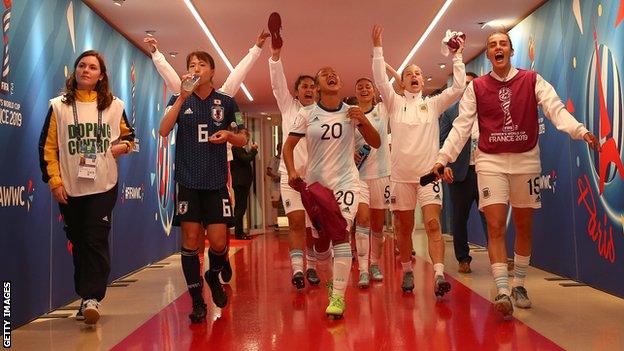Women's World Cup: How Argentina lost their team - and then fought back
- Published
Highlights: Argentina 0-0 Japan
Three years ago, Argentina effectively had no women's team. They had no coach, no fixtures to play and no Fifa ranking. This was why their opening game of the 2019 Fifa Women's World Cup against Japan felt so special for them.
When the full-time whistle went at the Parc des Princes last Monday, some Argentina players dropped to their knees and sobbed uncontrollably; others embraced while sporting face-aching grins.
Why was there such a visceral reaction to a group game that finished 0-0?
Argentina had pulled off a huge achievement by gaining their first-ever World Cup point - and they had done it against Japan, the 2011 winners and 2015 runners-up.
They earned their second with a stunning 3-3 draw against Scotland in a final group game they were losing 3-0 with just 26 minutes remaining.
This is all the more impressive given the work they had put in just to make it to France.
"It's not been easy at all," said Eliana Stabile, Argentina's left-back. "We've been fighting all this time in Argentina and now we have to push a little harder because what we do now will make it easier for those who come after us."
Their progress is certainly being noted back home.
"What is happening now with this team has never happened in history," said local journalist Nico Valado.
"Their game [against Japan] was shown by the national broadcaster; children were given time off to watch it in schools. At the 2003 and 2007 World Cups, they were like shadows. Now people know who they are."
In their two previous World Cup appearances, Argentina had lost all six group games, conceding 31 goals - including 11 in one match against Germany - and scored only twice.
Then they failed to qualify for Canada in 2015. They lost all their funding from the Argentine Football Association (AFA) - and were effectively disbanded.
As the men's team, guided by Lionel Messi, reached three major finals - the 2014 World Cup, and the 2015 and 2016 Copa America - the women's national team did not play a game for more than two years.
When the women eventually got some funding to regroup, the two teams were worlds apart.
"I came back in 2017 and when I came home, everybody had changed," recalled Carlos Borrello, reinstated as head coach after being sacked when the team disbanded.
"We had a women's team but we only had 15 days to train before the Copa America.
"We didn't know much because I didn't have much material to look at."

Argentina kept their first World Cup clean sheet on Monday - they had previously conceded an average of 5.5 goals per game
The women were supposed to be paid around £7 for training expenses while on international duty, but the payments didn't arrive on time. And on one occasion, they travelled to a game through the early hours - from 04:00 to 09:00 - and slept on the bus because they were not given accommodation.
"Eventually they went on strike, stopped training and stopped playing again after a Uruguay friendly in August 2017," said Valado.
"They sat down with the AFA board and said: We want this, and we want that. Because of this, they now train on real grass, not plastic. They have locker rooms and accommodation."
The fight for equal standards continues.
Only four months ago, after Borrello's side secured qualification for the World Cup via the play-offs, the AFA agreed to hand out professional contracts for the first time; top-flight clubs must have at least eight players on pro deals which mirror those of the men's teams.
The association offers around £2,300 per month to help finance the contracts.
Argentina's team in France is now made up of a combination of amateurs and professionals but as a collective they have become the public faces of a wider cultural shift.
According to Valado, that followed the poor World Cup performance of the men at Russia 2018, where they scraped through the group stage before going out to France in the last 16.
"People at home are tired of the men's team," said Valado.
"The World Cup last year was disgusting for us. Now they have something new, something pure.
"There's a feminist movement in Argentina [called Ni Uno Menos] and the power of the woman, and the players, is very important now.
"It's thanks to hearts of the players and their rebel spirit that we have been able to plough forward," said Borrello.
BBC Sport has launched #ChangeTheGame this summer to showcase female athletes in a way they never have been before. Through more live women's sport available to watch across the BBC this summer, complemented by our journalism, we are aiming to turn up the volume on women's sport and alter perceptions. Find out more here.